- Home
- Marilynne Robinson
What Are We Doing Here? Page 6
What Are We Doing Here? Read online
Page 6
I would expect accident to be invoked here, or the operations of the random. But the particle has made the rules. Quantum indeterminacy is mine, says the particle. And so are gravity and the speed of light. If we propose other universes, as many do now, we must assume differences among them that could well be radical. Our universe emerges consistently with constraints that we must assume are special to it, since slight difference would ramify through eons. So “accident” and “randomness” can only be thought of relative to our expectations. If they are hedged in by even this degree of particularity, then perhaps we need other names for and conceptions of the phenomena we take to be described by them. Quantum entanglement is haunting evidence that what we take to be true about space and time need not pertain even within our universe. How can any kind of determinism, even of accident and its consequences, be imagined if space and time are in any degree local and circumstantial? Perhaps they are a shared illusion—though anyone who has watched a cat calculate time and distance, then pounce, knows that they are not our illusion only.
The meaning of all this for the new theology is that we have estranged ourselves from Being by applying certain tests to determine the reality of things, tests that are themselves implicitly naïve or tendentious definitions of reality. Human consciousness has at least as great an impact on the planet as any force of nature, yet its existence is in doubt because science does not know how to describe it. If there were a lens that could capture the psychological or spiritual weather massing on this little globe, we all know it would show us very dark clouds. If climate change is worrisome, this brooding turn in our collective mood has the potential to exacerbate this and a thousand other problems, and to disgrace us as it does so.
Therefore, in conclusion, a theology for our time should help us to know that Being is indeed the theater of God’s glory, and that, within it, we have a terrible privilege, a capacity for profound error and grave harm. We might venture an answer to God’s question, Where were you when I created—? We were there, potential and implicit and by the grace of God inevitable, more unstoppable than the sea, impervious as Leviathan, in that deep womb of time almost hearing the sons of God when they shouted for joy. And we are here, your still-forming child, still opening our eyes on a reality whose astonishments we can never exhaust.
The Sacred, the Human
The Truman G. Madsen Lecture on Eternal Man at the Wheatley Institution at Brigham Young University: September 17, 2016
Lately I have been reading Jonathan Edwards, and reading about him, for a lecture I will give in January. I have mentioned a number of times that many years ago my sense of reality was transformed by my reading a section of his treatise The Great Christian Doctrine of Original Sin Defended, more specifically, a footnote about the nature of moonlight. I was assigned to read Edwards in an undergraduate philosophy course. His treatise rescued me from the small and dreary determinisms that were offered to us as insight into human nature and motivation, then Freudianism and behaviorism. His argument is that there is nothing in Being that accounts for its persisting as itself from moment to moment. The constancy of moonlight is not intrinsic to it but is instead the effect of the continuous, continuously new reflection of sunlight. So with the apparent continuity of everything that exists, of existence itself. This is a perfectly sound insight from the point of view of physics. For Edwards it means that creation is constantly renewed as an act of God, who therefore remains free relative to his creation, within constraints he has set for himself, which preserve order, identity, and intelligibility. He is also therefore pervasively present and engrossed in it.
How long has the so-called rationalist side of this old and very central controversy argued that reality is a mechanism of sorts whose own workings are fully sufficient to account for its origins and evolution, its past, present, and future? Three centuries at a minimum. On this basis, religion has been marginalized as an unnecessary and implausible account of things that are properly within the boundless domain of science—including, emphatically, human nature and motivation. We know enough now about the infinitely small and the unfathomably vast, about the fine textures of Being and the torrents of galaxies and constellations that pour through the universe, to be, it would seem, beyond our long fascination with the mechanical and also beyond our antique habit of treating this anomalous biosphere as if it existed in isolation from the cosmos that contains it and of which it is made, or as if we could extrapolate from our quotidian knowledge of it to arrive at a fair description of reality as a whole. Determinism should be a little humbled by the fact that for a century causality itself has been seen to be a profound mystery, the old rules of sequence and locality not exhaustively descriptive.
Yet the disciplines that treat of the human psyche are determinist as ever. These days we are believed by many to be locked into perpetual cost-benefit analysis, unconsciously guided by a calculus of self-interest somehow negotiated at the level of the genome. The, shall we say, biomechanics of all this are never described, of course. It has the apparent advantage, for its exponents, of marginalizing the mind, in fact anything that has ever been called the psyche, not to mention the soul. So did phrenology, eugenics, Marxianism, Freudianism, behaviorism. We have no capacity for meaningful choice, so they all tell us.
Every one of these theories was powerful in its time, then passed into the kind of history we are always ready to forget. But the thing conserved out of all this, the thing always to be found within every new packaging, is a gimmick for asserting that we are not ourselves, that we are deceived, self-deceived, in the matter of our motives and experience. To annul the self as an intelligent moral actor is a terrible thing, objectively considered. It is literally the stuff of horror movies. Yet whatever form this notion takes in a given moment, the impulse is powerful and persuasive, and not just to sophomores. Having no more, perhaps less, empirical basis than belief in elves and fairies, a fairly recent appearance of this impulse under the term “the selfish gene” has enjoyed considerable authority. Its precursors have been embarrassed by scientific advances or have simply gone out of style, in either case demonstrating their lack of empirical basis. The selfish gene, a theory that does not even nod to the complexity and fluidity of the genome, will no doubt hang around until some new costume is found to dress up the old idea.
Behind the conception of reality as transparent and self-sustaining, and of the mind as a delusion that enables uncountenanced behavior whose sources are elsewhere—in the id, in the reptilian brain, in the genome—there are at their origins and in their propagation two intentions, which are undertaken as if to spread enlightenment, with something like the benign intent that moves Christians to send out missionaries. One purpose is to dispel belief in God, and the other is to dispel the soul as concept and as felt reality. I want to be very clear about two things before I proceed. First, in these strange times I do not want to be taken to suggest a conspiracy, a cabal, a sinister other, or an intent on anyone’s part to undermine all we hold dear, etc., etc. This strain of thought, this scientism, has been active and influential in Europe and Britain for centuries, among those very cultures with whom we feel special affinity. Second, I believe instead that I am describing a deep and long-standing tendency in human and Western consciousness, one felt as persuasive, and as progressive and inevitable, by many religious people. As irrational, ill-informed, and unlovely as I find these theories, I know that many people take precisely the same view of religion, and often, to our disgrace, they have very good grounds. I know excellent people who take these theories to be true, and feel in good conscience that they owe them loyalty and belief because they are true. I know also that they are accepted as the only alternative on offer when the institutions of religion make themselves malicious or ridiculous. There are churches that uncritically accommodate themselves to these theories, so far as possible and farther—as they accommodated themselves in earlier generations to eugenics and racial science. And then there is the large segment of the popula
tion who know nothing about religion at all, except what they hear from its very loudest voices, and who are therefore, understandably, secularists.
So great is my respect for secular people that I wish they had a metaphysics worthy of them. I would be very interested to see a secularism based on contemporary science, though I grant the difficulty of deriving a metaphysics from anything as surpassingly dynamic and complex as the universe has proved to be at every scale, and as continuously open to reconception as our understanding of it must be. Of course positivism forbade metaphysics as a language and as a mode of thought, which amounted to radically narrowing the questions it would or could address while jettisoning a great part of Western tradition. An experience-based model of reality, which was proposed to take tradition’s place, was inevitably smaller and simpler, friendlier to thinking that did not aspire to engage with ultimate things, or even, perhaps especially, with penultimate things, notably the human mind or soul. Experience, as the word is used in this context, does not include acknowledged mental experience, reasoning, or intuition, certainly not aesthetic response. I must assume, however, that these theories I mention answer to the sense of reality, that is, to the mental experience, of their exponents—are, intuitively plausible to them, affirmed inwardly. This response may be helped by the fact that what might seem most radical in them has actually been familiar for a very long time.
To illustrate this point I will quote a few passages from Religion and Science, published in 1935 by the Nobel Prize winner Bertrand Russell. His prize was in literature, but he speaks very confidently for science—a latitude I must grant him, since I do the same sort of thing. Russell says that though psychology is still at an early stage of development “something has been achieved, and much ancient error has been discarded. Much of this ancient error was associated with theology, either as cause or as effect.” He follows the idea of the soul through Plato, Descartes, Kant, Hegel—and concludes that “within the realm of what can be known there is no room for the conception of substance, or for its modification in the form of subject and object. The primary facts which we can observe have no such dualism, and give no reason for regarding either ‘things’ or ‘persons’ as anything but collections of phenomena.” He says that “psychology, in like manner, is finding it necessary to give up such concepts as ‘perception’ and ‘consciousness,’ because it is found that they are incapable of precision.” Following the implications of science as he understands it, he offers this: “So long as it could be supposed that one ‘perceives’ things in the outer world, one could say that, in perception, one was ‘conscious’ of them. Now we can only say that we react to stimuli, and so do stones, though the stimuli to which they react are fewer. So far, therefore, as external ‘perception’ is concerned, the difference between us and a stone is only one of degree.” Then this: “Memory, it may be said, is something distinctively ‘mental,’ but this again may be denied. Memory is a form of habit, and habit is characteristic of nervous tissue, though it may occur elsewhere, for example in a roll of paper which rolls itself up again if it is unwound.” And finally, for science, “there does not seem to be such an entity as the soul or self.” This is the always breaking news, always newly arrived at, always a conclusion compelled by the latest science, quaint as this science appears to us now when invoked by the earlier writers in this tradition. The patient didacticism is there from the beginning, the erudite exposure of the errors of religion, and, of course, the triumphant scientism. Whether contemporary exponents would mention stones or rolled paper in discussing human motivation or memory, I doubt. But the case Russell makes for the nonexistence of consciousness and the self is entirely up-to-date, if only in its conclusions. This might make him a man of foresight, a prophet—together with Hume and many others—or it may simply mean that these premises and conclusions never change, however profoundly the science upon which they make their claims for authority transforms itself. I believe the selfish gene is now making its way toward the museum of discredited notions, to crowd the dusty case already occupied by assorted homunculi—the blond beast, economic man, the evolutionary throwback, the dysgenic, the blank slate. Then what rough beast, its hour come round at last—no, it will be a beast whose claims to alarm are encouraged in the genteel environments in which it finds itself at home, a place always already prepared for it.
When we had no better access to the brain as an object than by mapping the contours of the skull to gauge the relative proportions of the lobe of veneration and the lobe of amicability, when early Darwinism could interpret unfavored traits as evidence of evolutionary primitivity or atavism, when Freud could offer his sketch of a three-chambered brain that would neatly accommodate the three contending personae of the Freudian self, when the gene and its functions seemed fixed and straightforward, then it would have been relatively understandable to insist on a reductionist model of the human self—relatively understandable, that is, as opposed to its persistence in the present, despite the insight we have now into the endless complexity of everything, from the subatomic to the intergalactic. The neurons and synapses in that brain are now reckoned in numbers that are literally astronomical. Elegant nature can hardly be imagined to have put such unfathomable complexity to such fundamentally simple work as these psychologies have posited for it. Edwards has a place in creation for things good in themselves. The spectacular brain would surely be one. But this is a theistic notion.
In general it is difficult to say what anything is without reference to what it does. We are surrounded on every side by the effects of the human brain on the material world, which are certainly as complex altogether as anything on earth after the biosphere. The arts, music, and philosophy are things of inexhaustible interest to human societies over centuries. Still, there are those who would account for all this brilliance and urgency as the effect of tiny increments of applied self-interest. And there are those who can be persuaded that this probably is the case. But the great truth, never taken into account, is that nothing is simple. Absolutely nothing. Mitosis in a cell seems to be about as complex as the Thirty Years’ War, which is to say that complexity in both cases beggars description. There is absolutely no analog in reality as we now know it to support reductionism of the kind that offers a fundamental simplicity as the essential character of anything at all. Therefore this immutable core belief, which survives and flourishes when science has moved far past the point where either ignorance or incomprehension could seem to sustain it, is interesting as an artifact. Why is it conserved, and why is it, as it has been since its emergence, a powerful presence in the world of ideas, an effective rebuke to all acknowledgment of the profundity of the human mind and circumstance?
* * *
Edwards’s synonym for a human being is “a moral agent.” Agent means, of course, that one can act, and moral implies that one’s actions are meaningful in a social as well as a cosmic context. To me this sounds like reality. His definition is, I think, empirically testable, at least in its worldly applications. Any newspaper could be entered in evidence. I have just begun his treatise Freedom of the Will, which I had not looked at since college. My memory and his reputation lead me to expect him to deny that the will is free, though his thinking is always vastly more nuanced than his reputation. In any case, in the degree that his argument is determinist, a defense of an ancient and troublesome element of Christian doctrine, it compares interestingly with these modernist theories I have described. Although they are often proposed as being more humane and rational than Christianity, often with special reference to the dread theological terms election and predestination, they are themselves so starkly determinist, so determinist in every iteration, that this is arguably their point. Then again it could be true that the limits any sane person feels on his or her meaningful freedom are real and narrow enough to make at least a tentative argument for determinism. This would have been truer of the generality of people in any previous century. Or, again, the same tacit argument could be made by the accide
nts and injustices anyone must be aware of in the ordinary course of life.
Be that as it may, it is interesting to note how consistently these theories diminish or dismiss the phenomenon of consciousness called the self, a given of experience if there is such a thing in this world. This is true even when the governing motive behind all behavior, as they understand it, is self-interest, which seems to me to imply alertness to the interests of an entity that satisfies for their purposes the definition of a self. While on the one hand they might insist they intend a radically reduced and deromanticized entity, on the other hand, the interests of a self beyond the level of subsistence are highly circumstantial and particular, so the self can only be assumed to be complex, likewise whatever unnamed and undescribed mechanism it is that reckons its interest from one occasion to the next. (I excuse phrenology on this point, since it did grant to the brain lobes devoted to a number of amiable traits.) Interestingly, Russell allows for the possibility of freedom, with reference to the human will. What this could mean in the absence of self or consciousness I cannot fathom and he does not explain—but those who argue as he does are too confident of their thinking to check it for anomalies. For him freedom is implied by quantum indeterminacy, reasonably enough. Elsewhere he says, “The belief that personality is mysterious and irreducible has no scientific warrant, and is accepted chiefly because it is flattering to our human self-esteem.” If our Being participates in something as mysterious and irreducible as quantum physics—and how could it not?—the presumption ought to be on the side of extraordinary human complexity. If this elevates us in our own regard, well, sometimes the truth must be accepted, whatever its consequences. I hasten to add that we must assume we share this complexity with all Being—quantum doesn’t play favorites. This might lead to a revival of that fine awe at the wonders of creation so characteristic of theology.

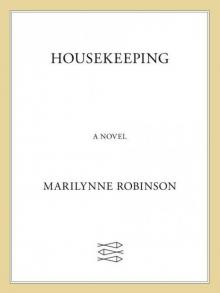 Housekeeping: A Novel
Housekeeping: A Novel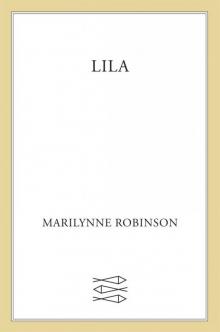 Lila
Lila Mother Country: Britain, the Welfare State, and Nuclear Pollution
Mother Country: Britain, the Welfare State, and Nuclear Pollution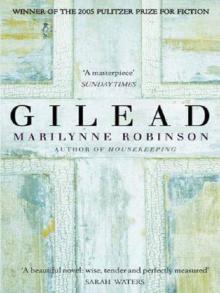 Gilead
Gilead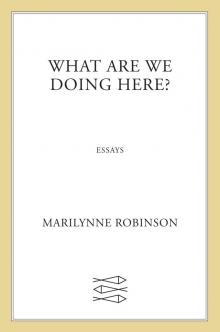 What Are We Doing Here?
What Are We Doing Here? Home
Home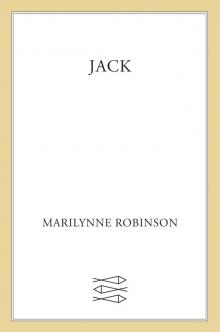 Jack
Jack Mother Country
Mother Country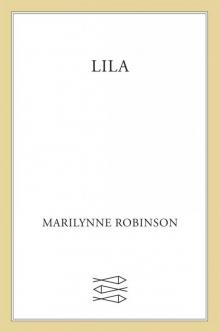 Lila: A Novel
Lila: A Novel Gilead (2005 Pulitzer Prize)
Gilead (2005 Pulitzer Prize)